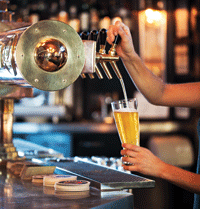In 2001, alcohol-related crimes were infecting the pub scene in Manchester, England. To solve the problem, the Greater Manchester Police introduced Best Bar None (BBN), an accreditation and awards program. It was created to reduce crime while promoting responsible management, service and operations; to reduce alcohol-related incidents; to raise the standards of licensed establishments, to improve the economic vitality of the nighttime economy; and to build relationships between industry partners, law enforcement and the community.
By 2007, the program had swept through the U.K., with more than 100 individual programs and thousands of accreditations. Since then, a Best Bar None survey has shown a nine-per-cent reduction in serious violent crime in Manchester and 70 per cent fewer police calls to BBN-accredited venues in Doncaster, England.
As news of the successful program travelled across the pond, the idea of safer, more responsible bars resonated with Eric Baich, manager, Projects – Strategic Initiatives, Social Responsibility, Alberta Gaming and Liquor Commission (AGLC). The manager was so interested that he jumped on a plane with his executive director and headed to a Best Bar None conference in England to learn more about how the program was reducing the number of occurrences of over-intoxication, violence around bars, impaired driving and sexual assault. They thought a program that outlines best practices would be a good fit in Alberta. “So, when [BBN] gave us permission, we became the first jurisdiction outside the U.K. and across the Atlantic to start the program,” Baich boasts.
Baich soon learned the tenets of the program: to become accredited as a Best Bar None-approved establishment, owners have to complete a comprehensive application proving their establishment meets pre-determined criteria (see “Playing by the Rules,” left) before being audited during an in-person visit.
In Edmonton, members of the AGLC, city officials and police adapted the program to Alberta standards. The pilot program launched in 2010 with 311 eligible pubs, bars, lounges, clubs and hotel/restaurant lounges across the city. In the first year, 63 of the 311 licensees applied and 38 were accredited. BBN Edmonton had 42 participants by year two and 48 by year three.
The program is an opportunity for Edmonton bar and restaurant owners to boost relations with local law enforcement. “Police officers are a part of the assessment process,” says Baich, explaining how the program involves in-person inspections by uniformed officers. “At first, we were worried, because we didn’t want this to be [seen as] an enforcement program, but then, in talking to some of the Manchester police, what they found was it started changing relationships between police and the licensees.”
And, the city’s BBN licensees have found their employees are more efficient in dealing with alcohol-related issues. “We’re noticing there is a much greater commitment to productivity, so rather than let things happen and then react to it, [the establishments] are trying to prevent and intervene,” Baich explains. “You can go to a nightclub now and see that security is much more trained and present, so the clientele are starting to see that [establishment’s owners] are committed to providing a venue that’s going to keep them safe.” Staff morale is also growing, thanks in part to an annual BBN Oscars’-style awards ceremony, attended by city officials, police and sponsors. Outstanding licensees are honoured and awards are presented to top performers in each category.
So, it makes sense that AGLC has expanded the program to Calgary, and, last year, Tony Elenis, president and CEO of the Ontario Restaurant Hotel and Motel Association (ORHMA), brought the program to Ontario, with the accreditation of 37 establishments in Toronto’s bustling Entertainment District. “It’s a very vibrant part of Ontario. It also has so many different types of patrons, so you get the stakeholders in one spot,” he explains. The Ontario program was modified to include restaurants, and instead of using police officers to perform in-person assessments, it employs third-party assessors. In addition to promoting responsible alcohol service, Elenis hopes that having licensees on board with the program could impact the number of city bylaws that restrict local bars and clubs.
But, despite the success in Alberta and Ontario, attracting more guests to establishments because they’re accredited continues to be a problem. So, Baich’s department is working with a social marketing agency to spread the word about the program through creative campaigns that are expected to launch next year. What’s more, licensees are showcasing their accreditation by posting plaques and signage in their doorways.
And, although restaurants, pubs and clubs can experience a high rate of turnover, Rob Medal, operating partner at Bier Markt in Toronto, says it helps to have the BBN guidelines built into training programs. “The program itself was tremendously helpful to reinforce that we were doing the right thing. It levelled the playing field in our neigbourhood and made everyone better operators and simply better neighbours,” says Medal, whose restaurant garnered the BBN Ontario award last year for Best Overall Establishment. “As time passes intelligent and savvy guests will look for bars that have the designation, because it means they are better run, better managed, safer and simply better environments.”
Meanwhile, as Edmonton’s BBN enters its fourth year, the team is hoping to expand the program to other jurisdictions and modify it to launch in smaller cities. Such goals are within reach, with news that reps from Saskatoon as well as Red Deer, Alta., Fort McMurray, Alta. and Lethbridge, Alta., have approached the AGLC to learn more about the program. In Ontario, ORHMA’s Elenis hopes to grow the program across the province, likely launching in Ottawa’s ByWard Market next.
Most importantly, BBN promoters are optimistic that the new standards will revolutionize the industry. In fact, Baich dreams of a time five years from now when the program will be prevalent and drinking-age patrons will visit establishments where procedures and policies are safer than ever before. “This program fits in shifting that culture. It’s not an anti-drinking culture,” it’s about having a good time, while being as safe as possible, he says.




















